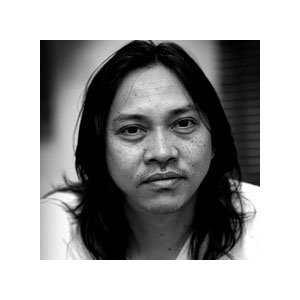Background
Ahmad Fuad Osman was born in 1969 in Kedah, Malaysia.

Amira College Uitm Puncak Alam Road, 42300 Shah Alam, Selangor, Malaysia
Ahmad Faud Osman left his hometown of Baling, Kedah in 1987 to obtain a degree in Fine Arts degree at the then Intittute Teknologi MARA, now Universiti Teknologi MARA (UiTM).
Photo by Ong Soon Hin.








Ahmad Fuad Osman was born in 1969 in Kedah, Malaysia.
Ahmad Fuad Osman left his hometown of Baling, Kedah in 1987 to obtain a degree in Fine Arts degree at the then MARA Institute of Technology, now Universiti Teknologi MARA (UiTM). He received his Bachelor of Fine Arts in 1991.
It was there that he met fellow artists Bayu Utomo, Hamir Soib, Ahmad Shukri and Masnor Ramli - all of whom became part of the artist collective called Matahati, which played a pivotal role in the development of Malaysian contemporary art.
Ahmad Fuad Osman rose to prominence first as a member of Matahati, one of Malaysia’s most significant contemporary art collectives of its generation. His first selected group exhibition was "Yong Contemporary" at the National Art Gallery in Kuala Lumpur, Malaysia in 1990. His first solo exhibition "Experiments With Truth" took place in NN Gallery, Selangor in 1998.
His works most often involve installations and paintings, and he did show viewers a tongue-in-cheek perspective to his career with the Recollections Of Lost Memories (2007) show, where he reimagined Malaysian history by inserting modern elements into historically archived black and white photographs.
Osman was back in Kuala Lumpur for "Primitive", his sixth solo exhibition at the A+ Works of Art gallery in Sentul. He presented seven evocative works for his 1st solo exhibition since 2007 - a collection of works spanning 15 years, from 2003 to 2018. The exhibition ended on March 3, 2018.
Throughout his career as an artist, he was always drawn to communicate the multi-faceted and subtleties of the human condition. Drawing on oral narratives, popular publications and subaltern archives, he often pieces together fragments of the past told through conflicting narratives; thus offering ways to rewrite established canons.
Ahmad Fuad Osman has exhibited internationally, including "Blackout" at Kunsthal Rotterdam 2019, Sharjah Biennale's Leaving The Echo Chamber (2019), among others. Besides, his work has also been exhibited in institutions such as the National Visual Art Gallery and Petronas Gallery Malaysia; Tacheles Berlin, Germany; The Seoul Metropolitan Art Museum, Korea; Singapore Art Museum; Gertrude Art Centre, Melbourne, Australia; Guangdong Museum of Art China; Yokohama Museum of Art, Japan; Manes Gallery, Czech Republic; and Red Mill Gallery, Vermont, United States.
In addition, Osman has been a resident of Rimbun Dahan, Sungai Buloh, Malaysia (2007-2008); Goyang National Art Studio, Korea (2005-2006) and Vermont Studio Center, Johnson, United States (2004).
His works can be found in the collections of Balai Seni Negara, Galeri Petronas and the Singapore Art Museum, amongst others.
Ahmad Fuad Osman currently lives and works between Bali and Kuala Lumpur.
Ahmad Fuad Osman is best known as an acclaimed contemporary artist. Osman’s work has been shown in a number of international exhibitions.
During his career, Osman received a number of awards, including the Juror's Choice Award of Phillip Morris Malaysian Art Awards from the National Art Gallery, Kuala Lumpur in 2000 and 2003. He also received the Juror's Choice Award of the APBF Signature Art Prize from the Singapore Art Museum, Singapore in 2008.
Midnight song (Mulu)
Paint your brain
Self (in quest) portrait: About the journey
Longing for freedom
Silent sorrow
Issshhhh... busuknya!!!! Hangpa bawak masuk (s)apa ni?!
Quarante
Wasiat sulaiman
Melugai
Fatamorgana #1: Dream On
At cross purposes
The Birth Of Tragedy Sidang Sunyi Para Siddartha Agony And Ecstasy @140410B
Aaarrgh... Get your filthy hands out of me!!!
The drowning
All That Is Solid Melts Into Air
Sociopolitical themes such as identity politics, the abuse of power and historical amnesia have long been key concerns in the conceptual works of Ahmad Fuad Osman. He also noted that he didn’t want to position himself as a politically-engaged artist and wanted to be free.
Quotations:
"I’m more interested in the moral aspects of politics. I don’t want to position myself as a politically-engaged artist. I don’t want to be a video artist. I don’t want to be a painter. I don’t want to be a photographer… I want to be an artist, so today I can talk about politics. Tomorrow, I can talk about my mother. The day after that, I can talk about whatever that’s happening behind my place. I’m free."
"I rather leave the interpretation of my work to the viewers. As for me, I’d just like to be known as an artist."
Ahmad Fuad Osman is one of the founding members of the Matahati artists’ collective which formed in the 1990s.
